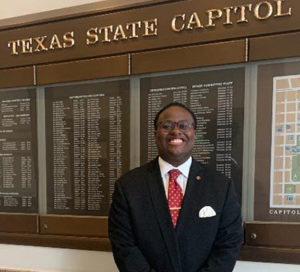AUSTIN—Voting rights, gun rights, critical race theory and abortion restrictions captured headlines during the 140-day regular session of the Texas Legislature. But lawmakers also dealt with—or failed to deal with—a variety of other issues.
Efforts to expand legalized gambling gained no ground in spite of intensive and expensive lobbying by casino operators, but neither did efforts to expand Medicaid coverage for low-income Texans.
The contentious session included a walkout by House Democrats that broke quorum and killed—for now—an elections bill opponents labeled “voter suppression” and proponents described as ensuring “election integrity.” But in the process, they made a special session virtually certain.
As the House neared a midnight deadline, Democrats left the chamber and gathered at Mount Zion Baptist Church in East Austin, breaking a quorum and blocking a vote on a bill to limit early voting hours, restrict voting by mail and give greater power to poll watchers.
However, Gov. Greg Abbott promptly posted a message on Twitter saying “election integrity,” as well as “bail reform,” were emergency items that will be part of a special session.
“Ensuring the integrity of our elections and reforming a broken bail system remain emergencies in Texas,” Abbott tweeted. “They will be added to the special session agenda. Legislators will be expected to have worked out the details when they arrive at the Capitol for the special session.”
A special session to deal with redistricting already is scheduled for the fall. Abbott pledged to veto the section of the state budget that funds the legislative branch, making an additional special session in late summer likely.
Hot-button issues

Michael Evans Jr., public policy director for the Texas Baptist Christian Life Commission, voiced support for the principle of election integrity but deep concern about the specific measures Texas lawmakers passed.
“When you look at the language used in this legislation, it is far too close to what we saw in Jim Crow” laws that restricted the voting rights of Black Americans, he said.
Sign up for our weekly edition and get all our headlines in your inbox on Thursdays
A bill allowing Texans to carry handguns without a license—as well as legislation that permits hotel guests to keep guns in their rooms and grants school marshals authority to bring handguns into classrooms—passed in the legislature.
Texas lawmakers approved legislation that bans the teaching of critical race theory, which explores systemic racism, and they passed limits on classroom discussion of controversial current events.
“We need to know our history. Slavery happened. Black Americans have been denied the right to the quality of life others enjoyed. … Censoring what teachers can say about it in the classroom is a problem,” Evans said.
Lawmakers passed two key pieces of legislation restricting abortion—a “heartbeat” bill that bans abortions after a fetal heartbeat is detected and a “trigger” bill that immediately would prohibit abortion if, and to the extent, the U.S. Supreme Court overturns Roe v. Wade.
The “heartbeat” bill goes into effect Sept. 1, but abortion rights groups already have pledged to fight the law in court.
Aside from the “hot-button” issues that dominated social media, the lawmakers also considered other key matters during the regular session.
-
Public education
The state budget lawmakers approved generally sustained public school funding at the levels achieved in 2019, and the Texas House made clear its opposition to vouchers that would divert funds from public education to private schools.

Texas public schools will benefit directly from $7 billion in COVID-19 stimulus funds from the federal government, but the state could have secured significantly more for public education, said Charles Foster Johnson, executive director of Pastors for Texas Children.
Johnson said the legislative session that just ended included some of “the worst attacks on public education” he had seen, as the “forces of privatization” attempted to use the COVID-19 pandemic to undermine public schools.
While critics claimed the public schools “failed” students during the pandemic, Johnson insisted schoolteachers “demonstrated astonishing competence and compassion” during a difficult time.
Lawmakers rejected an attempt to tie funding for schools to their performance on standardized tests—an approach that would punish schools with a large percentage of low-income non-Anglo students, he asserted.
Johnson gave credit to ministers and concerned members of Texas churches for helping defeat or improve several bills that could have been detrimental to public schools.
Early this year, pressure from concerned Texans prompted Gov. Abbott to announce the state would “hold harmless” public schools rather than penalize them for attendance and enrollment declines due to the pandemic, and it led to a voucher measure being stripped from HB 3, the pandemic response bill, Johnson noted.
Pastors for Texas Children and its allies also succeeded in dramatically altering SB 1365, which initially would have granted the state commissioner of education broad authority to override local school boards, he added.
At the same time, Johnson voiced disappointment in lawmakers’ failure to pass several measures that would have provided greater accountability and local control over charter schools.
-
Gambling
Bills that would have expanded legalized gambling in Texas through daily fantasy sports and destination casinos died in committee, in spite of the support of major professional sports organizations in the state and lobbying by casino operators. Las Vegas Sands hired more than 50 lobbyists to push for gambling expansion in Texas.
“If money was the only deciding factor, we’d have had casinos in Texas 20 years ago. At the end of the day, sound arguments trump money, and we have sound arguments in spades,” said Rob Kohler, consultant with the Texas Baptist CLC.
In a session where many issues had to be categorized as partial victories or defeats, efforts to stop the further expansion of gambling in Texas represented “a clear win,” Evans added.
-
Medicaid
While lawmakers extended Medicaid coverage for low-income pregnant women from two months after birth to six months, they rejected efforts to expand Medicaid coverage significantly for uninsured Texans.
“We have not done enough to give child-bearing women access to basic medical care before, during and after pregnancy,” Evans said.
Protections can be built into the law to prevent individuals from taking advantage of the system without depriving women who genuinely need health care, he added.
Texas lawmakers have failed to pass any significant expansion of health care coverage since the Affordable Care Act became law in 2010, he noted.
-
Law enforcement
HB 88—the George Floyd Act—failed to pass. Lawmakers approved some limited measures related to police procedures, such as bans on chokeholds. Other bills, such as limits on qualified immunity for law enforcement officers, did not pass.
Evans expressed his hope Texas Baptists can model for the state at-large how to have “hard conversations” across racial lines about issues related to policing practices.
-
Criminal justice reform
Key elements of the Second Look Bill passed in the legislature. The legislation offers early parole to offenders who committed crimes as teenagers but served at least 20 years or half of their sentence and demonstrated good behavior.
-
Religious liberty and LGBTQ rights
Bills were introduced that would have punished counselors or therapists for discouraging homosexual behavior; forced Christian employers to provide insurance coverage for the spouses of same-sex couples; and amended the property code to create a special class of protection for “sexual orientation,” “gender identity” and “gender expression.” None of those bills passed in the regular legislative session.
“We want the LGBTQ community to have the human rights protections to which they are entitled without infringing on our First Amendment rights,” Evans said. “This is an issue that’s not going away.”
-
Payday lending and auto-title loans
The CLC worked to kill “bad bills” that would have made predatory lending easier; sought to improve some bills benefiting payday lenders that were certain to pass to minimize harm to the poor; and advocated on behalf of “good bills” that make it harder for lenders to “profit from people’s pain,” Evans said.
“It’s an ongoing fight and an uphill battle,” he said.















We seek to connect God’s story and God’s people around the world. To learn more about God’s story, click here.
Send comments and feedback to Eric Black, our editor. For comments to be published, please specify “letter to the editor.” Maximum length for publication is 300 words.